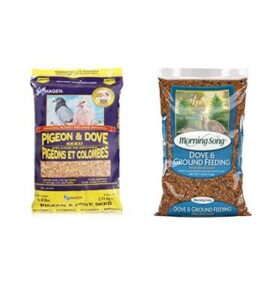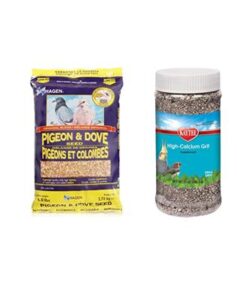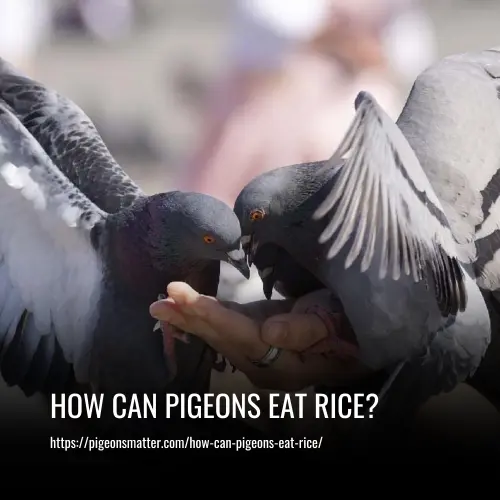Wild pigeons eat a variety of foods including grains, seeds, greens, berries, fruits, and occasionally insects, snails, and earthworms. They have an omnivorous diet and can adapt to different food sources in their environment.
Here Are Some Foods Wild Pigeons Eat:
- 1. Wheat
- 2. Oats
- 3. Corn
- 4. Sorghum
- 5. Barley
- 6. Rice
- 7. Flax Seeds
- 8. Peas
- 9. Sunflower Seeds
- 10. Leafy Greens
- 11. Snails
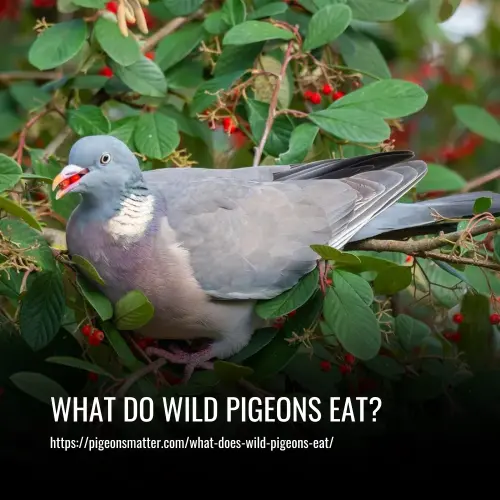
Foods Wild Pigeons Eat
Wild pigeons have a diverse diet that includes a variety of grains, fruits, and insects. Here are some common food sources:
1. Wheat
Wheat is a staple in a pigeon’s diet and can make up a significant portion of their daily intake. It provides a healthy balance of protein, fiber, and fat. Wheat also contains essential minerals like manganese, phosphorus, niacin, and sulfur, which are particularly useful during moulting.
Pigeons prefer harder-textured wheat grains, so it’s best to use dried grains that have had time to develop this texture. However, it’s important not to overfeed pigeons with wheat alone, as it can lead to unhealthy weight gain. Instead, mix it with other nutrient-dense options to create a balanced diet.
2. Oats
Oats are especially beneficial during the breeding season due to their high fat and protein content. The protein supports the development of chicks, while the fat and carbs provide energy for both the young and adult pigeons. Oats also contain important minerals like phosphorus, thiamin, and magnesium, which contribute to bone health and nerve functionality.
Racing pigeons are often fed oats before competitions to enhance their performance. Dehusked oats are easier for pigeons to digest, but they will consume oats in any form. However, due to their high nutritional value, oats should only make up a small portion (5% or less) of a balanced pigeon diet.
3. Corn
Corn is a staple food for pigeons and provides protein, fiber, and fat. However, feeding pigeons too much corn can lead to weight problems. During the winter, corn can provide insulation and is a good feed for cold seasons. It contains vitamins B1, B9, and C, as well as magnesium and potassium.
Raw corn kernels and popcorn are fine for pigeons, but salt and butter should not be added. Cracked corn should be avoided as it can lead to mold and fungus growth and canker sores in pigeons.
4. Sorghum
Sorghum, also known as milo, is part of a pigeon’s diet but is not a favorite menu item. It primarily offers fast energy through carbohydrates, along with iron, fiber, and a small amount of calcium. Many other birds have difficulty digesting sorghum and tend to choose more nutritious options.
Pigeons will eat sorghum if it is available, but they prioritize higher-quality foods. However, a diet heavily reliant on sorghum can lead to nutrient deficiencies as it primarily acts as a filler.
5. Barley
While barley is commonly used as pigeon feed, it is not their preferred choice due to its indigestible fiber content. It does contain some essential nutrients such as iron, vitamin B6, magnesium, potassium, and a small amount of calcium. However, the lack of significant fat or protein makes it unsuitable as the main component of a pigeon’s diet.
Pigeons will often avoid eating barley if given a choice. When more than 15% of a pigeon’s diet is composed of barley, it can negatively impact chick development and egg production due to its lack of vital nutrients.
6. Rice
There was a time when feeding raw rice to pigeons was considered dangerous as it was believed to expand in their stomachs and cause harm. However, it has been proven that pigeons can digest raw rice safely and even extract some nutrients from it. Rice is primarily composed of carbohydrates, with some protein and negligible amounts of iron, calcium, vitamin B6, magnesium, and fiber.
While pigeons can eat rice, it does not provide enough essential nutrients to be a significant part of their diet. This applies to all types of rice, including white, brown, and instant. Pigeons may consume rice primarily when there are no better food options available to them.
7. Flax Seeds
Flax seeds, also known as linseed, are enjoyed by pigeons due to their fat content. The oils present in flax seeds are beneficial for maintaining healthy feathers, making them particularly popular among racing pigeon owners.
Flax seeds also contain various nutrients, such as vitamin B1, copper, molybdenum, magnesium, phosphorus, and antioxidants. However, it’s important to offer them in moderation to avoid excessive fat intake and potential obesity.
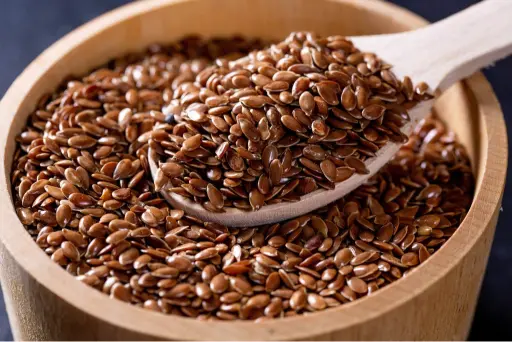
8. Peas
Peas are a favorite among pigeons and are easily digested. They are packed with vitamins A, B-6, C, and K, as well as minerals like iron, magnesium, manganese, and folate. They also offer a good amount of protein and have low fat content. Fresh or dried peas, including split peas, are suitable for pigeons to consume.
9. Sunflower Seeds
Sunflower seeds are nutrient-dense and contain healthy fats, protein, and fiber. They are rich in vitamins A, B-6, C, and E, as well as minerals such as calcium, copper, manganese, niacin, selenium, and zinc. Pigeons generally prefer the black oil variety due to its thin shells and higher oil content, but they will also eat striped sunflower seeds.
However, it’s important to note that feeding pigeons too many sunflower seeds can lead to diarrhea and weight gain. Therefore, it’s crucial to maintain a balanced diet for the pigeons and not rely solely on sunflower seeds.
10. Leafy Greens
Pigeons have a voracious appetite for leafy greens, such as cabbage and spinach. These greens provide a wide range of nutrients that are not found in seeds and grains. They are rich in calcium, vitamins C and K, omega-3 and omega-6 fatty acids, and antioxidants.
By including leafy greens in their diet, pigeons can maintain healthy mineral levels, especially calcium, which is often deficient in pigeons on seed diets. Additionally, leafy greens help pigeons stay hydrated due to their high water content.
11. Snails
Surprisingly, pigeons sometimes eat snails, particularly during the breeding season. This behavior is believed to be intentional rather than a case of mistaken identity. Snails are a great source of protein and nutrients for birds during breeding.
Snail flesh contains complete proteins, healthy fats, iron, calcium, magnesium, phosphorus, zinc, vitamins A, B-6, B-12, and K, along with folate and essential amino acids. The shell of the snail, which is 99% calcium carbonate, provides an additional source of calcium. Pigeons can break down the snail shell in their crop, aiding in digestion.
It’s important to note that wild pigeons have a varied diet and will also consume other grains, seeds, fruits, and vegetation available in their natural habitat.
What Do Wild Pigeons Eat When They Can’t Find Food?
When wild pigeons can’t find food, they will eat whatever they can find. This can include garbage, leftover food, paper, and even plastic. While it may seem gross to us, their digestive system is designed to handle these types of things and they usually don’t get sick from it.
In addition, they will also eat insects such as ants, beetles, and worms, which provide them with a good source of protein. Overall, wild pigeons seem to do just fine on this diet when they are unable to find their usual food sources.
What Should You Feed Wild Pigeons?
You can feed wild pigeons a mix of wheat, cracked corn, sunflower seeds, sorghum, and millet to attract them to your yard. You can spread the seeds on the ground or use a tray or platform feeder for easy access.
Providing dense shrubs or evergreen trees as potential nesting sites and putting up a nesting cone can also attract pigeons. Make sure to have a birdbath nearby with ledges for them to stand on.
What Do Wild Baby Pigeons Eat?
Wild baby pigeons primarily eat a substance called “crop milk” that is produced by their parents. This milk is made from the lining of the crop, where the pigeon’s food is broken down. As the chicks grow, they begin to eat adult food, which includes items like wheat, sunflower seeds, flax (linseed), oats, peas, barley, and leafy greens.
People who feed pigeon chicks often use cooked peas because they are the right consistency and provide a good variety of nutrients.
FAQs
Yes, pigeons can eat bread. However, if you’re feeding them from your home or a local park, it’s important not to rely solely on bread as it is low in essential nutrients. Instead, try alternatives like peas, crumbled Weetabix, porridge oats, or leafy greens such as lettuce and cabbage to provide a more balanced diet for pigeons.
Pigeons should not eat chocolate because it can be toxic to them. Chocolate contains caffeine and other substances that can cause vomiting, diarrhea, and potentially death in birds. Even though a pigeon may eat chocolate if given the opportunity, it is not recommended to feed them chocolate as it is not good for their health.
Yes, pigeons can eat sesame seeds. They are a nutritious food option for pigeons. When feeding pigeons, it is recommended to provide them with a mixture of grains and seeds, including sesame seeds. You can also feed them a mixture of sesame seeds, porridge oats, rice, sunflower seeds, and crushed peanuts.
Pigeons should not eat chips because they are deep-fried in unhealthy fats and provide little nutritional benefit. While pigeons can eat potatoes, the unhealthy fats in chips are not suitable for their diet. It’s best to provide pigeons with a balanced and nutritious diet.
Wild pigeons primarily like to eat grain, such as corn, wheat, barley, and oats. They also enjoy eating fruits and vegetables, including peas, berries, apples, and leafy greens. It’s important to note that feeding wild pigeons can lead to overpopulation and potential health issues for the birds, so it’s generally not recommended to intentionally feed them.
Conclusion
In conclusion, wild pigeons have a diverse and interesting diet that reflects their ability to adapt to various environments. From grains and seeds to fruits and insects, these birds truly know how to make the most of their surroundings.
